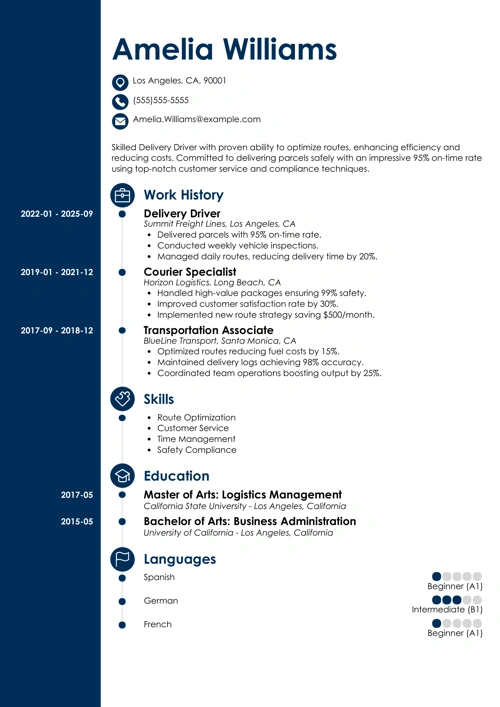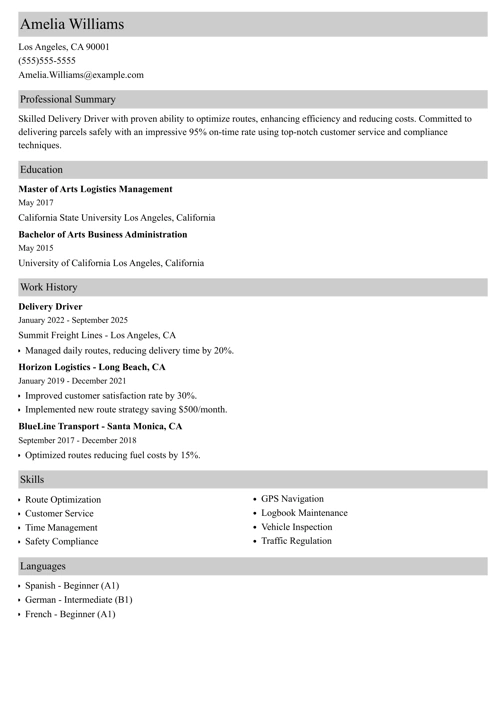Some say you should never list hobbies and interests on a resume. But what if I told you there are times when it’s better to do so?
Listing hobbies and interests on your resume might work in your favor, but you must do it right. Read on and find hobbies and interests to put on a resume that boost your chances of impressing the recruiter.
This article will show you:
- When you should include hobbies and interests on your resume.
- What’s the difference between hobbies and interests.
- What are the top interests and hobbies examples to put on a resume.
- How to list your hobbies and interests on a resume the right way.
Want to save time and have your resume ready in 5 minutes? Try our resume builder. It’s fast and easy to use. Plus, you’ll get ready-made content to add with one click. Explore our free resume templates and start building your resume today.
Sample resume made with our builder—See more resume examples here.
Should You Add Hobbies and Interests to Your Resume?
When searching for candidates, recruiters shuffle through hundreds of resumes. They look for the ones who match their expectations and stand out. Adding unique hobbies and interests to a resume makes you more attractive and memorable to your potential employer. Plus, it helps the interviewer create a full image of you.
On the other hand, there are some cases in which adding hobbies and interests to a resume is redundant or even harmful. For example, if you have vast experience and your resume already spreads over two pages, it might be better to omit hobbies and interests. Similarly, if your hobbies and interests have nothing to do with the job, you should forego them.
Pro Tip: Avoid hobbies and interests that could introduce biases or stereotypes. These can be political or activist affiliations, religious beliefs, spiritual activities, or similar things.
15 Top Examples of Hobbies and Interests to Put On Your Resume
You already know that the best hobbies and interests for a resume are those that match the job profile and present you as a passionate candidate.
At the same time, there’s a list of interests that employers value the most, and they like to see them when flipping through a stack of applications. See below:
1. Volunteering
There’s a reason we’re mentioning volunteering first—research shows that 82% of managers would rather hire someone with volunteering experience. Volunteering experience on a resume proves initiative and strong morals. It also teaches organizational and leadership skills.
2. Writing
Communication is the heart of every organization. Writing novels or publishing scientific papers gives a clear representation of your written communication skills.
3. Blogging
Blogging, just like any kind of writing, proves you have communication and writing skills. Reports show that communication is still one of the most desirable soft skills in any workplace.
4. Podcasting
The podcast format has become incredibly popular. Podcasting allows you to demonstrate you have industry expertise, know how to build an audience (marketing skills) and connect with thought leaders (networking activities and research skills). It's a good way to improve organizational skills, too.
5. Marketing
The percentage of US adults who were social media users amounted to 73.9% of the American population in 2023. The rise of social media has created new job professions such as social media manager, content creator, or SEO specialist. If you’ve ever made a Facebook page that drew an engaged audience or owned an Instagram profile with a stable number of followers, it will definitely make a good impression on the recruiter.
6. Languages
Speaking English might not be enough if you plan to develop your career. The three fastest-emerging languages of global consumers are Russian, Hindi, and Japanese. Studies have found a correlation between learning languages and problem-solving abilities, intelligence, and memory skills.
7. Photography
Photography is so much more than just taking pictures. It develops conceptual skills and technical expertise, but also teaches how to collaborate with others.
8. Travel
Curiosity, courage, and self-organization. Traveling can prove you’re not afraid of stepping outside your comfort zone and learning new things. Flexibility and adaptability are among the most important workplace personal traits.
9. Sports
It doesn’t matter what sport you do. Exercising develops many skills including self-discipline, collaboration, and patience, and helps bounce back from disappointment. Team sports create opportunities to improve leadership, communication, and interpersonal skills, too.
10. Yoga
You might say yoga is a type of sport, but it’s much more than stretching. It also involves concentrating on breathing and is one of the best stress-management techniques you can practice at home. And data shows a relaxed employee is less likely to leave their job.
11. Dance
Dancing isn’t just fun. It’s a social activity that teaches collaboration skills. It also boosts cognitive performance and helps to unwind, making you better at handling stress and pressure, which is crucial, especially for Gen Zs and millennials who report the highest levels of stress and anxiousness among all generations.
12. Art
Hundreds of jobs require creativity skills. Imagination and inventiveness are also parts of critical-thinking skills. And, according to the World Economic Forum, critical thinking is one of the skills needed to succeed in the modern workplace.
13. Reading
It doesn’t matter if it’s romance books that you read. Reading shows you follow your passions. It also prevents cognitive decline, reduces stress, and helps maintain work-life balance. The reading hobby might fit well with a copywriter’s resume or an academic CV that needs to prove your erudition.
14. Making Music
Making music is good for your brain. You might find it surprising, but learning how to play instruments fosters math and science ability. It also helps improve your mental performance (making you better able to concentrate) and your brain’s working memory.
15. Listening to Music
Listening to music lowers stress and elevates your mood. It strengthens learning and memory abilities, too. In the ever-changing corporate world, being able to learn new things on a daily basis is a top employability skill (especially with the rise of AI).
Make sure you pay attention to the skills that will be useful for the new position. What are the best skills to put on a resume? Read our guide: What Skills to Put on a Resume? [Examples+ 6 Tips]
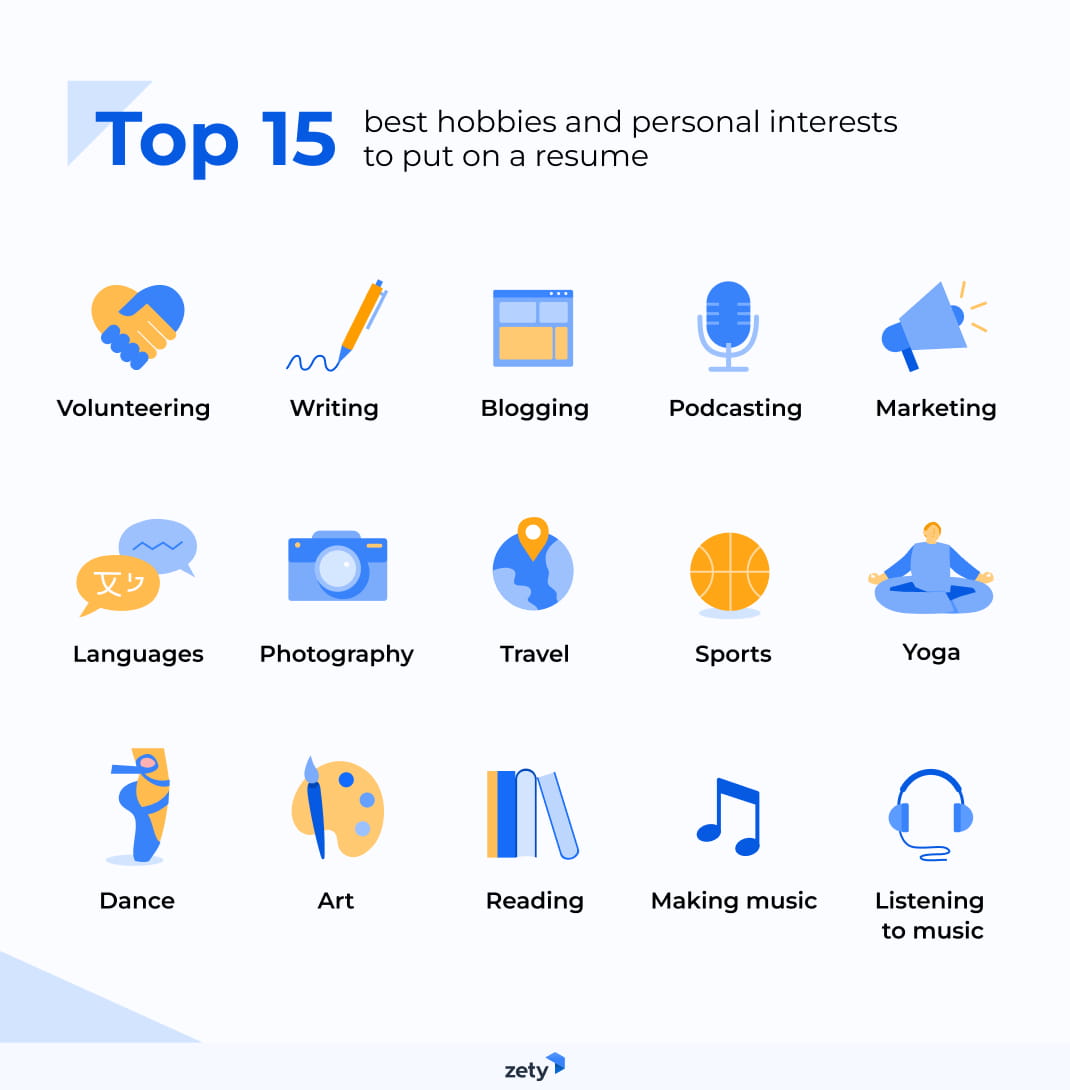
What’s the Difference Between Hobbies and Interests?
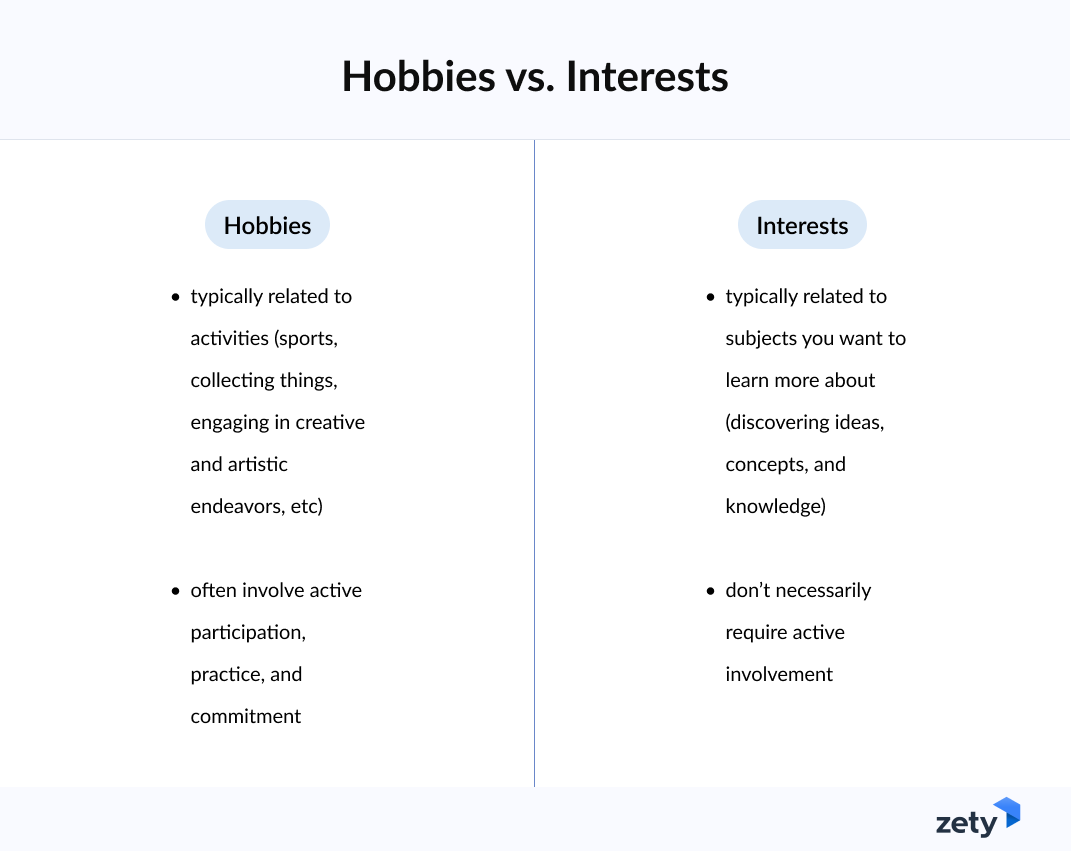
Both hobbies and interests are activities individuals do in their spare time, often not professionally and for no pay. They can be chosen for pleasure, entertainment, or pursuing individual development.
Hobbies are typically related to activities such as sports, collecting things, engaging in creative and artistic endeavors, playing instruments, etc. They often involve active participation, practice, and commitment.
Interests are subjects that fascinate you and make you want to learn more about them for curiosity or career development. They include discovering ideas, concepts, and knowledge, and they don’t necessarily require active involvement.
When to Put Hobbies and Interests on a Resume?
Most of the hobbies and interests you put on your resume will say something about you to the hiring manager. Here’s when you’ll make the best use of them:
- Empty space on your resume: If you’ve filled key resume sections and there’s still white space at the end of your document, consider adding a few relevant hobbies and interests.
- Limited experience and skills: If you’ve just graduated from a college or university and writing a resume with no work experience, add hobbies and interests to showcase your unique skills and passions.
- Job-fitted interests: Including relevant interests shows that you’re a fitting candidate who’s deeply interested and engaged in what they do.
- Culture alignment: Exploring the company’s culture and values and mentioning hobbies and interests that align with them can make you more attractive to an employer.
Use your hobbies and interests for a resume to resonate with the interviewer, give them an ice-breaker question, or signal character traits employers might look for.
Pro Tip: If your hobbies and interests don’t add significant value to your resume, focus on other sections that highlight your qualifications and unique traits.
How to List Your Hobbies and Interests on a Resume the Right Way?
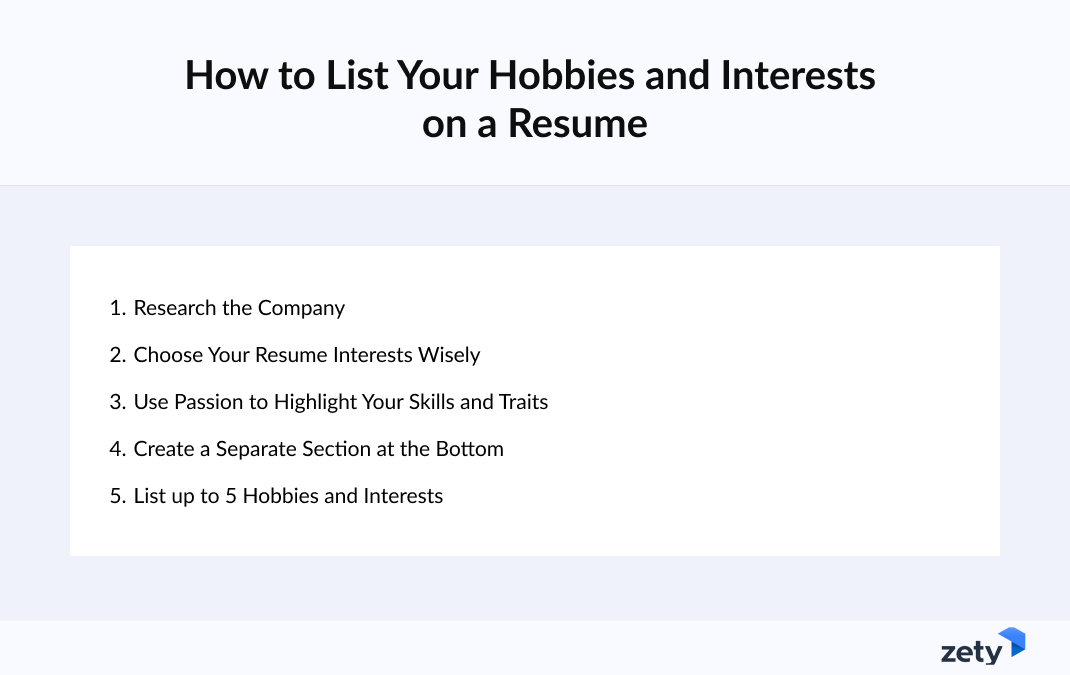
You’re already equipped with some must-have knowledge about good hobbies and interests to put on a resume. Now, let’s put it into practice.
Here’s how to list your hobbies and interests correctly:
1. Research the Company
You should always start by researching the company:
- First, check the job description: most job offers list traits companies wish the new employee to have.
- Second, take a quick look around their website: pay attention, particularly to employee profiles.
- Finally, check their social media accounts (LinkedIn/Twitter/Facebook): do they have a particular work culture? Would they find a unique hobbies and interests section on your resume valuable?
A quick research like that will help you make the initial selection for interests and hobbies examples that you could include in your resume.
2. Choose Your Resume Interests Wisely
When choosing activities, try to match them to desired personality traits. For example, if the job requires you to be “outgoing and a good team player,” sports are good hobbies to mention on your resume. Let it be basketball, which is a team sport exhibiting both qualities. In turn, leave out the bit where you like to sit alone in sweatpants knitting.
If possible, pick a variety of activities. By providing different interests, you show that you are flexible enough to be comfortable in many situations.
3. Use Passions to Highlight Your Skills and Traits
You can also select examples of hobbies for a resume that fill in gaps in your skill set.
Let’s say you want to apply for a graphic designer position. You have gaps in your skill set because you’ve only had a handful of internships in the past. Now, you’re applying for a graphic designer position. It might be a good idea for you to prove your eye for visuals by picking relevant hobbies to list on your resume.
Let’s take photography. Picking a related hobby reinforces the fact that you have the skills necessary for the job. Also, you have researched enough to know that the company hires family-oriented and entrepreneurial employees. So, you’ve decided to write about how you are an occasional freelance photographer for weddings.
4. Create a Separate Section at the Bottom
Your resume needs to be short and relevant, and so does your list of hobbies. To keep it brief, include only two or three relevant resume hobbies.
You may feel tempted to list your best hobbies in a resume like in the example below:
| WRONG |
|---|
|
Don't! It’s more effective if you provide a brief, specific description of each position in your resume’s hobbies and interests section:
| RIGHT |
|---|
|
Adding a list of interests and hobbies at the bottom of the page is a great way to end your resume. And it may help you make an impression on the recruiter.
5. List Up to 5 Personal Interests
Make sure your list of hobbies and interests for a resume doesn’t go beyond 5 unique activities. The number of hobbies and interests you add to your resume should be a reasonable selection, rather than an extensive list to fill the empty space.
Need more tips on using the information from the job description to tailor your resume quickly? Read our guide: 6 Proven Tips on How to Tailor Your Resume to the Job Description
Making a resume with our builder is incredibly simple. Follow our step-by-step guide, use ready-made content tailored to your job and have a resume ready in minutes.
When you’re done, Zety’s resume builder will score your resume and our ATS resume checker will tell you exactly how to make it better.
120+ Good Hobbies and Interests Examples for a Resume
The list of hobbies and interests for a resume doesn’t end there, though. There are countless hobbies and interests examples you can add to your resume to make it more appealing. We’ve gathered them into groups, so you’ll find yours easier:
Artistic Interests and Hobbies Examples
Choosing art as a hobby often indicates a creative mindset. It showcases the ability to think outside the box and invent fascinating ideas. Use this hobby when writing an art teacher resume or a graphic designer resume.
Here are some examples of art-related hobbies:
- Creating art
- Visiting museums and galleries
- Artists’ biographies
- Purchasing art
- Reviewing exhibitions
Hobbies Examples: Collecting
Collecting items such as stamps, coins, or vintage stuff shows dedication and attention to detail. It might also be proof of your organizational skills, especially if you showcase your collections to the public. You can include such hobbies when writing an artist's resume or a legal resume.
See the examples of collecting:
- Stamps
- Coins
- Postcards
- Seashells
- Rocks and minerals
- Fridge magnets
- Travel souvenirs
- Vintage items
- Designer clothing or accessories
- Dolls
Examples of Hobbies Related to Food
There are many ways in which food can be used as a hobby (and no, we don’t mean eating). Displaying food-related interests may demonstrate your creativity, precision, and patience and might be crucial when working on a food service job application such as a restaurant manager resume or a resume for a waiter or a waitress.
See the examples of food hobbies:
- World cuisines
- Baking
- Diets
- Food blogging
- Culinary tourism
- Reviewing restaurants
- Food photography
- Wine tasting
Creative Interests Examples
Hobbies like writing, drawing, painting, or photographing demonstrate creativity and open-mindedness. Employers may appreciate them, particularly if you’re targeting creative sectors and writing, for example, a marketing resume or an interior designer resume.
Check the creative hobbies examples below:
- Embroidery
- Knitting
- Sewing
- Drawing
- Painting
- Sketching
- Woodwork
- Scrapbooking
- Photography
- Writing
- Blogging
- Dancing
- Macramé
- Crocheting
- Pottery
- Sculpting
- Singing
- Acting
- Film
Hobbies and Interests Examples: Games and Puzzles
Displaying hobbies like games and puzzles indicates that you possess critical thinking and analytical skills. It also emphasizes your teamwork abilities and presents you as someone who likes collaborating. Analytical and strategic skills are more than welcome on an IT resume, a finance resume, a project management resume, and many others.
See if you have any of these games and puzzles interests:
- Chess
- Board games
- Video games
- Poker
- Card games
- Jigsaw puzzles
- Sudoku
- Crosswords
- Mobile games
- Scrabble
- Arcade games
Group Activities and Hobbies Examples
If you like to engage in group activities and demonstrate it on your resume, you’re likely to be perceived as someone with good communication skills and ease of adaptability. Such skills are valued across different professions, especially those involving dealing with clients. That’s why you should consider including these hobbies when writing a retail resume or a customer service resume.
Check the exemplary hobbies below:
- Volunteering
- Clubbing
- Paintball
- Bowling
- Bar crawls
- Trivia nights
- Pub quizzes
- Escape rooms
Literature Interests Examples
Literature-related hobbies might indicate a variety of traits and abilities, such as research and comprehension, critical thinking, or even understanding and empathy. If you’re writing a writer’s resume or an editor’s resume including literature hobbies on your resume is a must.
Here are some literature hobbies examples:
- Reading books
- Writing stories
- Writing book reviews
- Writers’ biographies
- Book clubs
- Comic books
Music Hobbies and Interests for Resumes
Engaging in music hobbies might show creativity, but also learning agility, focus, and perseverance. Such traits are Worth proving with your hobbies, especially when creating a teacher resume or a musician resume.
See music hobbies examples below:
- Listening to music
- Playing instruments
- Concerts
- Reviewing music albums
- Singing
Outdoor Activities & Hobbies for Resumes
Listing outdoor activities as hobbies on a resume conveys traits like physical fitness and health, resilience, and determination, but also time management and planning skills. Add these hobbies if you’re making a sports resume or a tour guide resume.
Check the examples below:
- Camping
- Hiking
- Trekking
- Climbing
- Gardening
- Going on walks
- Mushroom picking
- Foraging
- Horseback riding
- Outdoor photography
- Fishing
- Sailing
- Kayaking
- Birdwatching
Hobbies and Interests Examples: Self-Development
Though every hobby impacts us and contributes to our personal growth, there are some that particularly direct us toward self-growth and self-empowerment. Use them when writing a director resume, a manager resume, or an HR resume.
See the examples of self-development hobbies:
- Cooking classes
- Online courses
- Language classes
- Self-help books
- Journaling
- TED talks
Sports-Related Hobbies Examples
Showing sports on a resume is definitely an asset. Sports hobbies mean that you’re physically fit and healthy, disciplined, and well-organized. If you choose individual activities, it might show your self-confidence and resilience, while team sports foster communication and collaboration, which are valued in almost any profession.
See a brief list of sports hobbies examples:
- Football
- Basketball
- Hockey
- Running
- Skiing
- Cycling
- Gymnastics
- Yoga
- CrossFit
- Weightlifting
- Swimming
- Tennis
- Table tennis
- Baseball
- Boxing
- Martial arts
- Golf
- Archery
Travel Interests Examples
Engaging in travel hobbies shows your open-mindedness as well as curiosity and adaptability. Such traits are inevitable across numerous professions as they reflect a sincere desire to learn and grow.
View these travel hobbies examples:
- Sightseeing
- Camping
- Cruising
- Off-road driving
- Backpacking
- Travel blogging
- Writing hotel reviews
- Agritourism
- Motorcycle touring
- Scuba diving
If you need more tips on how to make a resume, read our complete list of 42 resume tips. We divided all the tips into quick 2, 5, or 30-minute fixes: 42 Amazing Resume Tips That You Can Use in 30 Minutes [Examples]
Plus, a great cover letter that matches your resume will give you an advantage over other candidates. You can write it in our cover letter builder here. Here's what it may look like:
See more cover letter templates and start writing.
Wondering what else is worth putting on your resume? Check out these guides:
- Certifications and Licenses on a Resume
- Publications on a Resume
- Language Skills on a Resume
- Volunteer Work
Key Takeaway
Just like in dating, listing hobbies and interests should be done with caution and for a reason. See a few tips that will help you get through it successfully:
- Make sure your hobbies and interests resonate with the job you pick, and the company culture, and that they become a conversation starter for all the right reasons.
- Use hobbies and interests especially if you have an empty space on your resume, limited experience, or very few skills that are relevant to the job.
- Don’t list hobbies and interests that could introduce biases or stereotypes. Avoid particularly political and religious affiliations.
About Zety’s Editorial Process
This article has been reviewed by our editorial team to make sure it follows Zety's editorial guidelines. We’re committed to sharing our expertise and giving you trustworthy career advice tailored to your needs. High-quality content is what brings over 40 million readers to our site every year. But we don't stop there. Our team conducts original research to understand the job market better, and we pride ourselves on being quoted by top universities and prime media outlets from around the world.


